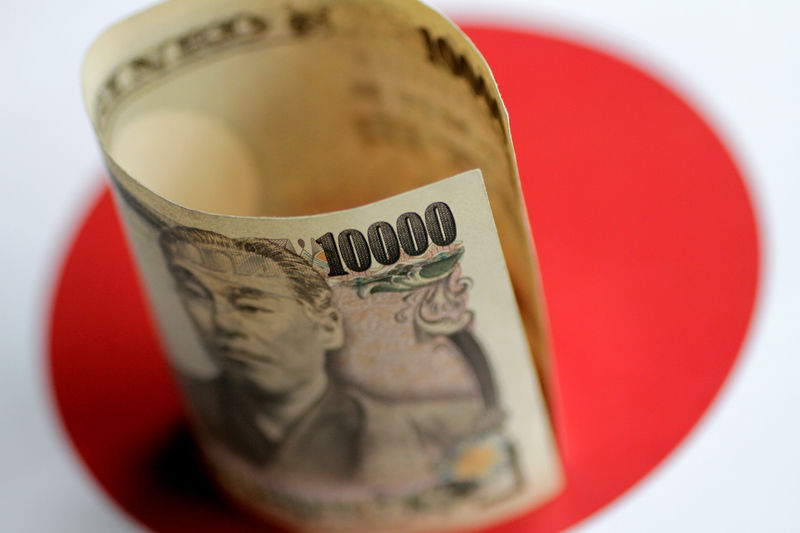By Tommy Wilkes and Tom Finn
LONDON (Reuters) - Shaky global stocks and a recent spike in U.S. equity volatility have sounded a warning for investors eager to find assets offering shelter in case world markets go belly-up.
Treasury bonds, gold, London property, and even bitcoin have lured investors during times of stress. In currency markets, the dollar, Swiss franc and Japanese yen are the traditional go-to choices.
But the conundrum of recent months is that few of these assets have lived up to their reputation for safety. Even as trade war fears, U.S. equity volatility and Italy's public spending plans have rattled investors, the yen
The Swiss franc (EURCHF=) has gained two percent against the euro in 2018 but fallen since early September, despite an Italy-European Union showdown over Rome's budget spending.
German and U.S. government bonds, having enjoyed a decade-long bull market run, are widely seen as expensive; gold
Only the dollar has reigned supreme, benefiting from being the world's most liquid currency, the robust U.S. economy and rising interest rates.
OLD FAVORITES
For all that, many think a major equity setback after such a long upward swing or a serious growth slump, especially in the United States, will leave the old favorites as the only reasonable hedges.
Both the yen and the franc will appreciate as all else tanks, investors predict.
"You would expect that to happen if the U.S. stock market came down 10 percent or European banks by the same, if there was a serious risk-off event," said Jim Leaviss, head of the retail fixed-income business at M&G Investments, which runs 351 billion pounds ($464 billion) in assets.
This month has offered some signs the yen will function as expected if market volatility spikes and investors dump stocks.
On Oct. 10, when U.S. shares plunged in their biggest one-day loss since February, the yen strengthened. On Tuesday, it again flexed its muscles, rising half a percent following sharp Wall Street losses the previous day.
(Graphic: Volatility spikes boost yen - https://tmsnrt.rs/2J0plpB)
Kaspar Hense, portfolio manager at BlueBay Asset Management, said he had bought the yen in recent days as a cheap way to hedge against a stock market correction.
"Japanese money will reverse its flow to international markets, that should strengthen the yen," he said.
MONEY HEADS HOME
Therein lies the appeal of the yen and franc. Boasting vast current account surpluses, both Switzerland and Japan have hefty assets overseas. When world markets fall, Japanese and Swiss investors tend to bring cash home, boosting their currencies.
Switzerland's surplus is worth nearly 10 percent of its economy while Japan's -- at roughly $184 billion last year -- represents four percent of GDP.
In contrast, the U.S. current account deficit is two percent while Britain runs a deficit of almost four percent of GDP.
(Graphic: G20 current account balances, pct of GDP - http://tmsnrt.rs/2HEN3pL)
Japan is the world's largest creditor, the net value of assets held by government, businesses and individuals topping 328 trillion Japanese yen ($2.92 trillion) at end-2017. Switzerland is also one of the world's biggest creditors, behind the likes of China and Germany. [nL3N1SV3YK]
That is what encouraged investors to pile resources into the yen, for instance, when North Korea tested ballistic missiles in 2017, or buy francs during the 2010-13 euro zone debt crisis.
Both currencies also enjoy mammoth foreign exchange reserves, stable political systems, and the liquidity investors demand in times of market flux.
"If there is some horrendous geopolitical event, or the U.S. growth story turned around ... it will be the yen and the franc that people buy," said Rabobank strategist Jane Foley.
So, how to explain the currencies' lackluster run in 2018?
Firstly, their underperformance likely reflects a broadly benign climate: world growth of 3.5 percent-plus and double-digit company profit growth have helped counteract worries over politics and trade.
Second, there is the possibility that the carry trade -- a popular strategy in which investors borrow in lower-yielding currencies like the yen and franc to invest elsewhere -- is not as important in the current cycle.
Thirdly, currency volatility remains relatively low, at a third of the levels of 2015-2017 <.DBCVIX>. That has curbed demand for francs and yen even when political worries escalated, for instance in Italy over the summer.
"The relation of the yen to so-called risk-off is non-linear. It reacts much more to a sharp volatility spike," said Alvin Tan, currency strategist at Societe Generale (PA:SOGN).
(Graphic: Franc shrugs off Italian saga - https://tmsnrt.rs/2IXWq5z)
The question for investors is what might roil investor sentiment to such an extent? And when?
Most agree a sharp and sustained 10-15 percent Wall Street slide that signaled the end of the long current bull market run, possibly coinciding with fears over U.S. and world growth, would be a catalyst.
"If you (have a) risk-aversion move because of global growth concerns, then you see the typical safe-havens like the Swiss franc, or specifically the yen, appreciate significantly," said Bernd Berg, global macro strategist at Switzerland-based Woodman Asset Management.
"And then you get the move to safe havens."
($1 = 0.7567 pounds)
($1 = 112.2500 yen)
